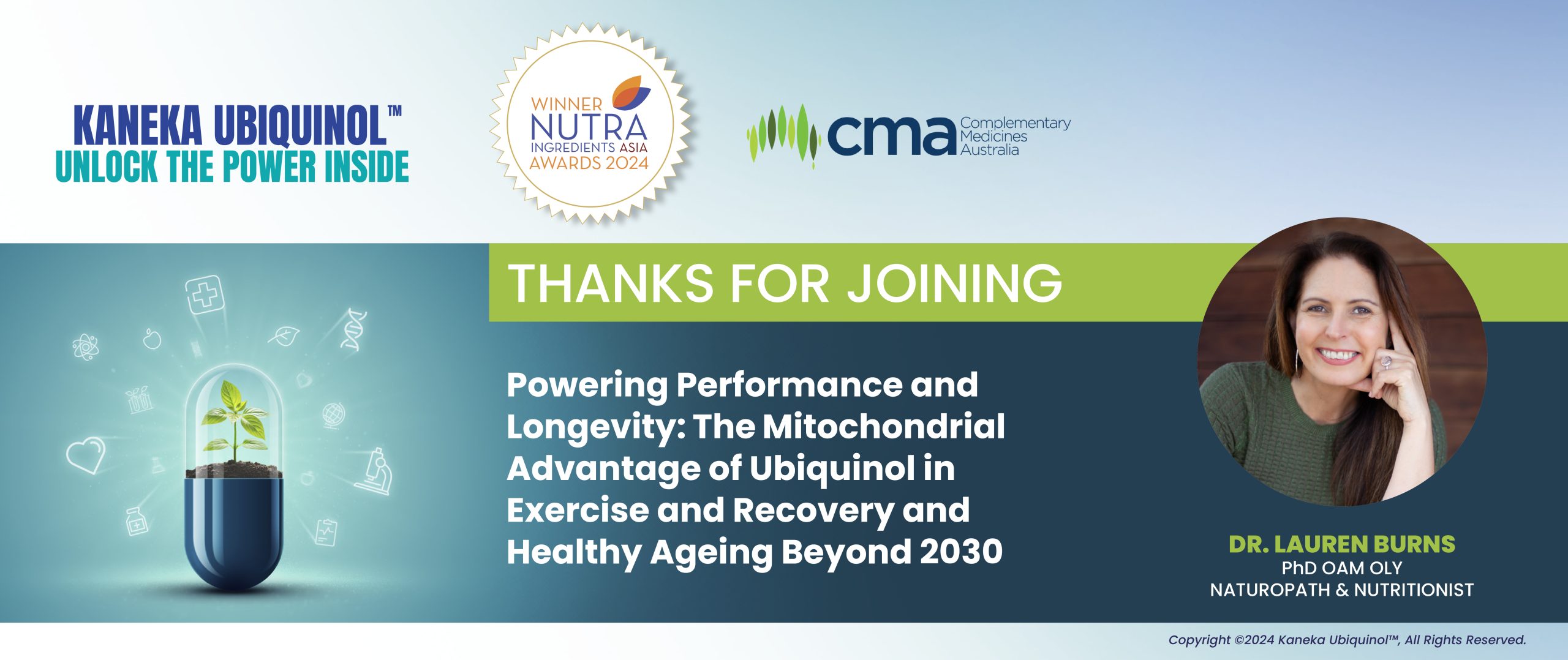
Benefits of Ubiquinol
Jan 2022Recent Article
What are the Ways Ubiquinol can Improve your Health?
Ubiquinol offers a range of benefits to support heart health, male fertility, healthy cholesterol and general wellbeing. It is the active, reduced form of CoQ10, and has superior bioavailability as it is more easily absorbed in the body.[i]
Mitochondrial Energy
Ubiquinol is essential is aiding the production of adenosine 5-triphosphate (ATP) in the mitochondria, the molecule that is primarily responsible for storing and transferring cellular energy. As the powerhouse of our cells, mitochondria are vital to nearly every biochemical reaction and cellular process in the human body.[ii] Ubiquinol is naturally occurring in the body, however the body’s ubiquinol levels may be depleted by aging and long-term oxidative stress.[iii] Deteriorating levels of ubiquinol are associated with inflammation throughout the body and accompanied by general feelings of low energy. Thus, optimal ubiquinol levels support mitochondrial health and may help relieve feelings of tiredness, improve performance and support energy production.[iv]
Heart Health
Due to its antioxidant properties, ubiquinol helps neutralise free radicals that have the potential to cause oxidative stress, which can result in cell and tissue damage that may impact heart health.[v] Ubiquinol also promotes optimal cardiovascular health, as a study from Heart, Lung and Circulation found that ubiquinol helps to maintain a healthy heart by providing the cellular energy needed to keep the heart pumping efficiently.[vi] Additionally, ubiquinol has also been found to help maintain healthy levels of LDL (low-density lipoprotein) in adults.[iii] This is important as Increased LDL is linked to an increased risk of cardiovascular disease, diabetes, hypertension, hypertriglyceridemia, and atherosclerosis.[vii]
Male Fertility
Male fertility factors contribute fully, or in part to 50% of all infertility issues.[viii] These influencing factors include poor quality sperm which is due to the morphology and motility of the sperm as well as the low sperm count and/or blockages in the tubes of the reproductive system.
Ubiquinol has been found to protect sperm from oxidative damage, which is a key contributing factor to infertility in 30-80% of male infertility cases.[ix] Oxidative stress impacts male fertility by negatively impacting sperm preservation and motility, sperm to egg recognition and fertilisation. Hence, Ubiquinol is linked to consequent improvements in sperm concentration, motility, and antioxidant status in infertile men.[x] There is also a strong correlation between ubiquinol content in seminal fluid and sperm count and motility. As sperm cells require a high energy level to fertilise the female egg, and this motility is dependent on ATP energy production, supporting and ensuring that the body has adequate ubiquinol levels are critical.[x]
Use only as directed. If symptoms persist consult your healthcare professional.
References:
[i] Mantle F, Dybring A. Bioavailability Of Coenzyme Q10: An Overview Of The Absorption Process And Subsequent Metabolism. Antioxidants 2020;9(5):386.
[ii] Garrido-Maraver J. Clinical Applications Of Coenzyme Q₁₀. Frontiers In Bioscience 2014;19(4);619. |
[iii] Stocker R, et al. Ubiquinol-10 Protects Human Low Density Lipoprotein More Efficiently Against Lipid Peroxidation Than Does Alpha-Tocopherol. Proceedings Of The National Academy Of Sciences 1991;88(5):1646-1650.
[iv] Hernández-Camacho JD, et al. Coenzyme Q10 Supplementation In Aging And Disease. Frontiers Physiology 2018;9.
[v] Ernster L, Dallner G. Biochemical, physiological and medical aspects of ubiquinone function. Biochimica et biophysica acta 1995;1271(1):195-204.
[vi] Kloer H, et al. Combining Ubiquinol With A Statin May Benefit Hypercholesterolaemic Patients With Heart Failure. Heart, Lung and Circulation 2020;29(2):188-195.
[vii] Kanonidou C. Small Dense Low-Density Lipoprotein: Analytical Review. Clinica Chimica Acta 2021;520:172-178.
[viii] The Fertility Society of Australia & New Zealand [Internet]. Fertility Society of Australia and New Zealand. 2021 [cited 28 June 2021]. Available from: https://www.fertilitysociety.com.au/
[ix] Duca Y, et al. Current and emerging medical therapeutic agents for idiopathic male infertility. Expert Opinion Pharmacotherapy 2019;20(1):55-67.
[x] Palani A, Ahmed A. Impact Of Oxidative Stress On Semen Parameters In Normozoospermic Infertile Men: A Case–Control Study. African J Urology 2020;26(1).
You can share this by:
Keep up-to-date with Ubiquinol News
Ubiquinol Headlines

Retail Pharmacy: Healthy Ageing in the Spotlight
Apr 2025Category: Ageing, Antioxidants, APP, Conference, Conferences, Endurance, Health, Health Industry, healthy ageing, Immunity, In The News, Mitochondrial health, Nutrition, Online, Stress, Ubiquinol, Vitamins, wellnessRead More
Retail Pharmacy: The Impact of Loneliness on Heart Health
Apr 2025Category: cardiovascular health, dr ross walker, Heart, In The News, Mitochondrial health, Online, UbiquinolRead More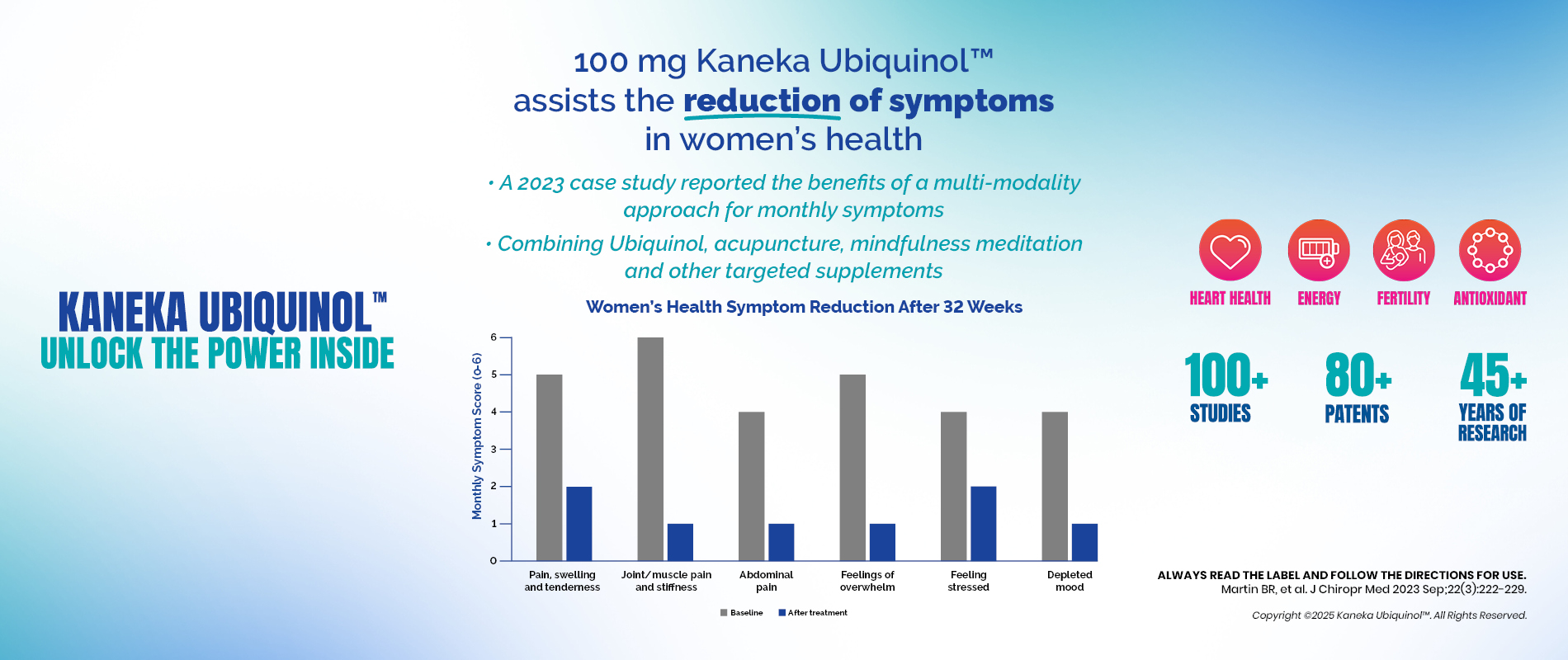
Ubiquinol for Women’s Health
Apr 2025Category: Ageing, Antioxidants, Fertility, Kaneka, Mitochondrial health, Ubiquinol, wellness, Women's HealthRead More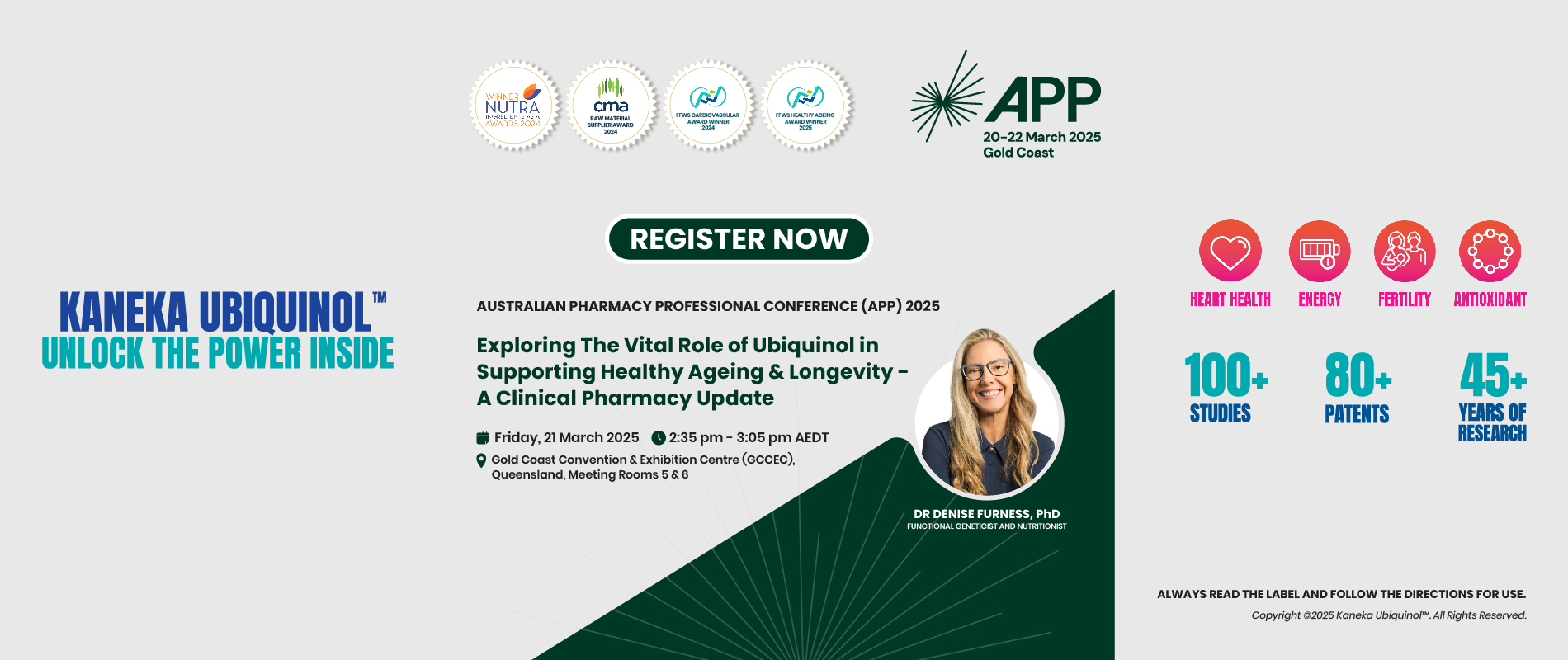
Kaneka Ubiquinol™ at APP 2025: Advancing Healthy Ageing & Longevity
Mar 2025Category: Ageing, Antioxidants, APP, Conference, Conferences, Energy, Fatigue, Health, Health Industry, healthy ageing, Kaneka, Mitochondrial health, Nutrition, UbiquinolRead More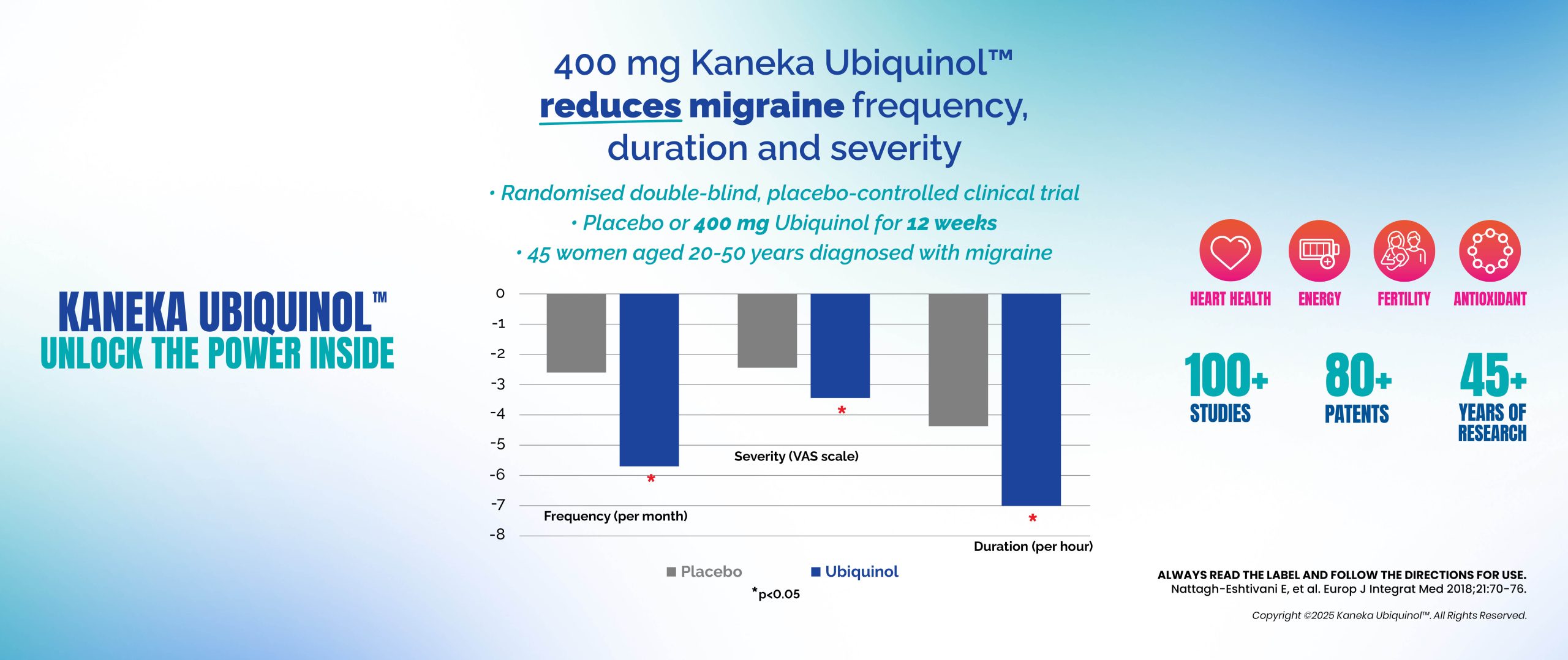
Ubiquinol: Supporting Migraine Relief Through Cellular Energy
Jan 2025Category: Antioxidants, complementary medicine, Energy, Fatigue, Health, Health Industry, healthy ageing, Kaneka, Mitochondrial health, Nutrition, Stress, Ubiquinol, Vitamins, wellnessRead More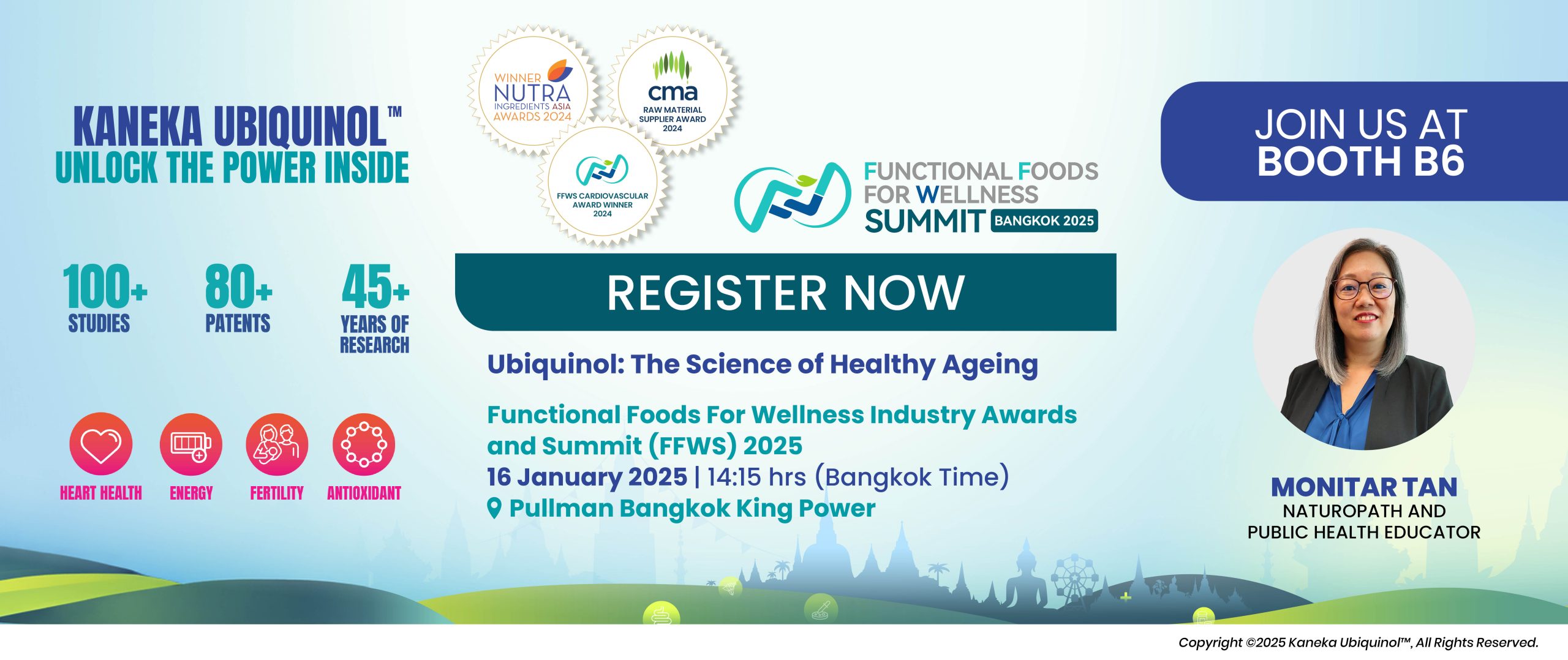
Kaneka Ubiquinol™ at Functional Foods for Wellness Industry Awards and Summit, #FFWS2025
Jan 2025Category: Ageing, Antioxidants, Awards, cardiovascular health, Conference, Conferences, Energy, Fatigue, FFWS2025, Health, Health Industry, healthy ageing, Kaneka, Menopause, Mitochondrial health, Nutrition, Ubiquinol, VitaminsRead More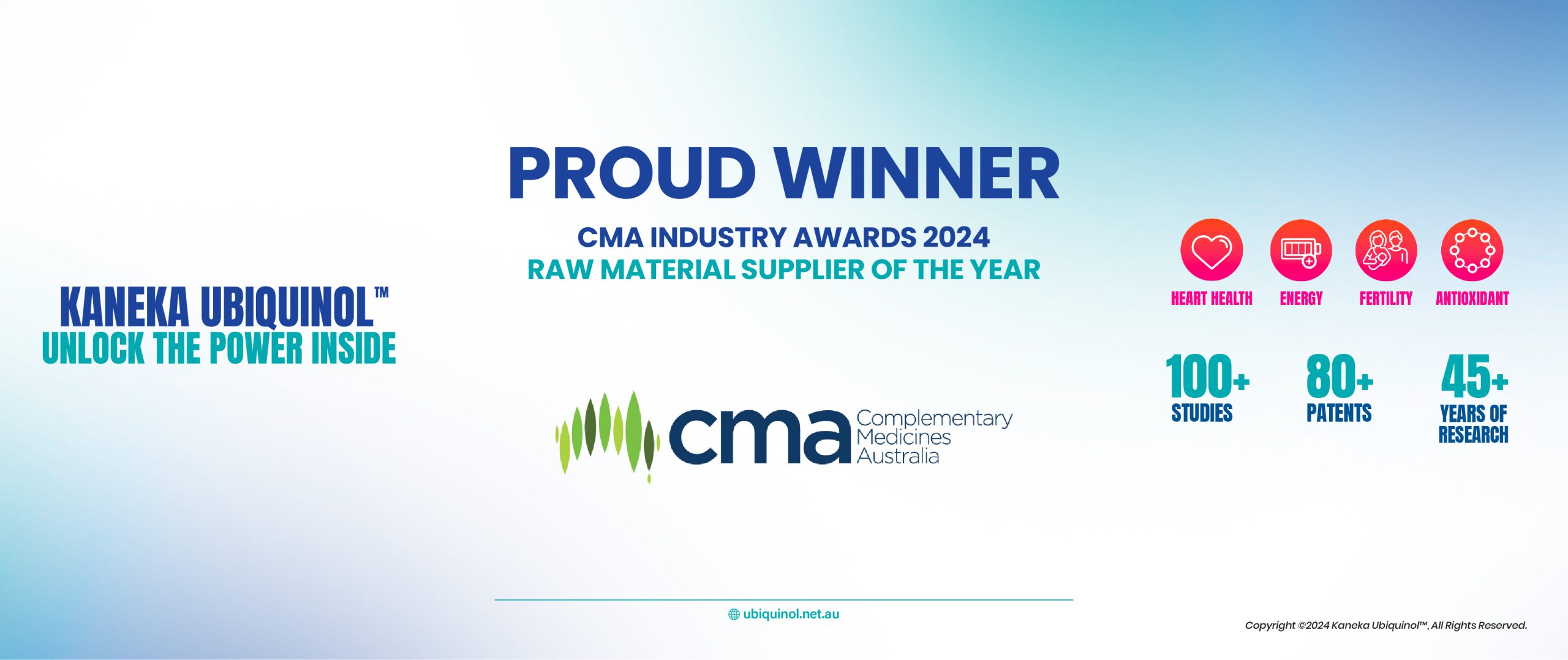
Kaneka Ubiquinol Wins Prestigious Complementary Medicines Raw Material Supplier of the Year Award 2024
Dec 2024Category: Ageing, Awards, cardiovascular health, complementary medicine, Conference, Conferences, Endurance, Energy, Fatigue, Fertility, Fitness, Health, Health Industry, healthy ageing, Heart, Immunity, In The News, Kaneka, Lungs, Memory, Mitochondrial health, Nutrition, Online, Stress, Ubiquinol, Vitamins, wellnessRead More